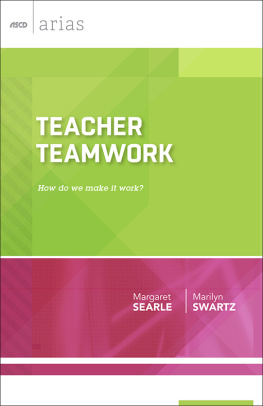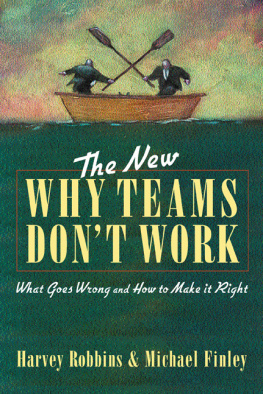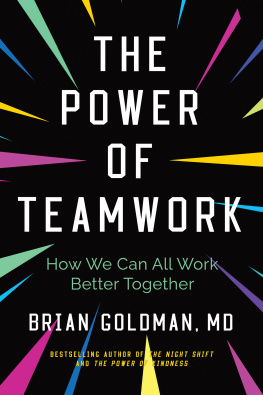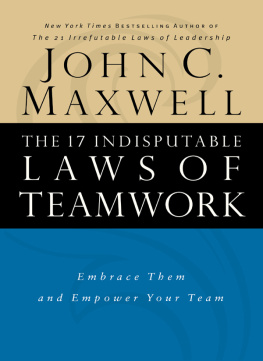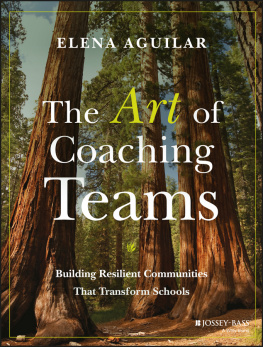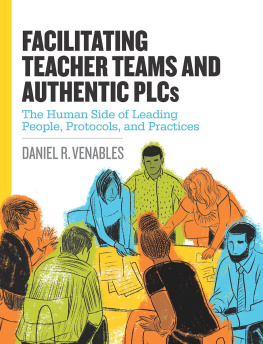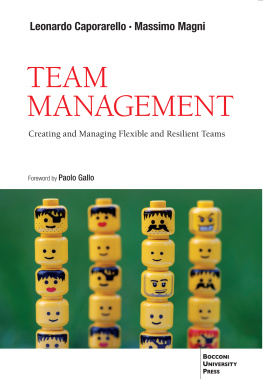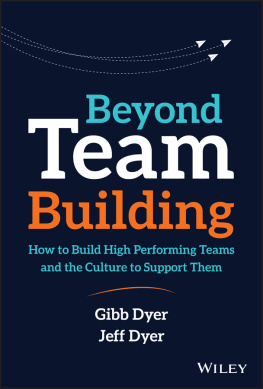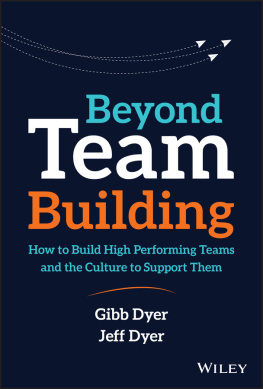


Introduction
The best teamwork comes from men who are working independently toward one goal in unison.
James Cash Penney
When we asked educators across the nation the question, "How well do your teams use their common planning time?" the same issues kept popping up. "I would rather eat glass than go to a meeting at our school. Its a waste." "I need my planning time to do my own work." "If I would die during our team meeting, the transition would be very subtle. So boring!"
We know that working together can help us solve tough problems and keep our sanity at the same time. People have far more potential for reducing anxiety, addressing complex issues, and improving creativity when they work in teams, so why do many educators have such adverse reactions to teamwork? Perhaps they do not take the time to establish unity and purposethe glue that holds a team together. Maybe they forget to apply the oil of routines, norms, and procedures to make things run smoothly.
This book will guide paraprofessionals, teachers, and supervisors through simple steps to move your school from "groups of reluctant players" to "highly effective teams." We will look at how the needs of your team change as you move through predictable stages of team development. The first section provides guidelines for setting up purpose, protocols, and norms. If you are an established team, this section will serve as a quick reminder to make certain you didnt skip any basic steps. The next section discusses ways to build the skills necessary for resolving the conflicts that eat away at team time. The following section focuses on reducing conflict through solid decision-making procedures. The last section provides strategies for building the capacity a team needs to take on tough problems.
If your teams follow this advice faithfully, ongoing frustrations about team time will be replaced by feelings of accomplishment and satisfaction. The insights and procedures in this book are simple to learn, but creating an environment of collaboration is not as easy as just knowing the steps. To build productive teams you need to intentionally create an environment of enthusiasm and engagement. So lets take a look at elements of effective teaming.

Establish Guidelines and Protocols
If everyone is moving forward together, then success takes care of itself.
Henry Ford
Think of the most enjoyable, satisfying experience you have ever had as a team member. It may have been a choir or a sports team, a community or school group, or a club you were interested in. The team may have been two people or 22 people working together. List the qualities that made this teaming experience enjoyable and satisfying.
Even though each persons positive experience is different, the list of what makes the experience great tends to have the same basic themes. Here is a summary of the top six statements we heard from educators we surveyed:
- We worked on things so important that I knew it was worth my time and effort.
- Group members were competent and cooperative and made all members feel that they were an important part of the process.
- We were well organized, efficient, and flexible.
- We stayed committed and I was proud to be a part of the quality work that the team produced.
- Communication was honest, upbeat, and positive as well as clear and timely.
- I felt supported and grew personally as a result of being part of this team.
Things like worthy goals, sense of belonging, commitment to quality and feeling supported are the essential glue that binds a group to both the work and each other. Organization, communication, and flexibility act as the oil that reduces friction and keeps things running smoothly. Now think of your own team. How many of these statements accurately describe how members feel about your group?
Support and commitment doesnt just happen. It takes intentional work to get people to put aside self-interest and act for the good of the team. People always start out as a group of individuals and if they hang together as they go through what B.W. Tuckman calls the four stages of group development (1965) they become a highly functioning team complete with all the joy and satisfaction that implies. These four stages are Forming, Storming, Norming, and Performing.
The Forming Stage of Teaming
At first members are highly dependent upon their leader for direction. Members tend to be polite and hopeful but at the same time wary and unsure about the team and how each member fits into it. During this "getting to know you" time members are reluctant to voice differences of opinion. Controversy feels like unsafe territory because trust has yet to be established. People are unsure of the "who, what, when, where, how, and why" of the work, so they hold back on commitment until they have answers. This holding back can prevent the team from getting important work done.
What Does the Team Need At This Stage?
During the Forming Stage teams need to clarify their purpose, set up norms and procedures, and form relationships. For some teams this stage takes months and for others this stage happens quickly. Many successful groups we interviewed attributed their teams initial success to the strength of their leaders. They said that in the beginning the leaders played a critical part in helping the team get a clear mental picture of both the goal and the processes for working collaboratively. These leaders fostered team ownership of the processes as well as responsibility for the results. They focused as much on developing positive interpersonal dynamics as they did on the work at this stage. This "laying the groundwork" part of team-building often frustrates people who want to "get down to business," but it is relationships, common vision, trust, and collaborative practices that create the cornerstone for keeping morale and productivity high.
A team from Garfield Elementary in Ohio said their secret for successful teamwork was quality time. They said that a district-sponsored training launched their biggest boost in productivity. The training gave their team guidance as well as uninterrupted time to plan and get to know each other personally and professionally. Trust and a sense of purpose developed as their vision and work became clearer. A calm environment with time to talk is essential for forging relationships that result in a strong collaborative team.
Creating an Inspiring Vision
There is an old proverb that states, "A vision without a plan is just a dream. A plan without vision is just drudgery. But a vision with a plan can change the world." Research shows that having a clearly articulated high-impact vision is an essential characteristic of effective teams (Larson & LaFasto, 2001). When a team looks like it is capable of accomplishing something great and the challenge seems worth the effort, people want to be a part of it. According to our survey, lack of a significant purpose is a key problem with many school teams. Putting together schedules, studying data, and doing work imposed from outside the team were cited as examples of the uninspiring kinds of tasks most teams worked on.
Next page
